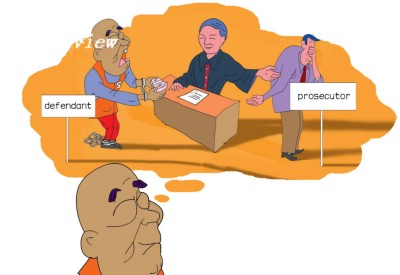
It is said that money can buy just about anything, and if a trend in China's criminal proceedings is to be believed, a new version of payola is alive and flourishing.
According to a report in the Yangcheng Evening News on January 31, a series of mediations in a recent homicide case, between families of the defendant and the victim, resulted in an agreed 50,000-yuan payout to the victim's family.
The No.2 Intermediate People's Court of Dongguan in south China's Guangdong Province conducted the mediations between the two parties involved. As a result of the cash settlement, the defendant got off with a lighter sentence, as his death penalty was given a two-year reprieve. It begs the question: Can criminals buy their way to lighter punishment?
Although the vice court president of the No.2 Intermediate People's Court of Dongguan said that the compensation paid by the defendant, in addition to state relief, is an attempt by the local court to protect the interests of the victim, this practice has ignited heated debate countrywide.
Many people saw this case as one of "buying life." Some even indignantly argued that, with the entrenchment of this new system, the rich could think nothing of killing others, secure in the knowledge that their wallets hold the key to life.
When monetary compensation is paid, an immediate execution is commuted to death sentence with two years' reprieve, which is further commuted to life imprisonment or even temporary punishment. Some believe this move is an insult to the rule of law.
The Dongguan Court explained that criminals are offered the choice of penalty mitigation only when they are willing to pay the compensation and the judges conduct mediation only when the victims' families consent to reducing the death penalty of the defendants.
According to Hong Daode, a professor at the Beijing-based China University of Political Science and Law, a Supreme People's Court regulation issued in late 2000 stipulates that courts could, when handing down sentences, consider compensation if defendants are willing to pay the victims or their families.
To date, the Dongguan Court has reduced more than 30 criminals' sentences and commuted the capital punishment of many to life sentences in exchange for cash.
By revealing such criminal cases to the media, the court hopes to publicize its efforts to safeguard the legitimate rights of the involved parties, dissolve social conflicts and build harmonious relations within the community. However, it seems these noble aims have not been altogether successful, as there have been many negative reactions and the public's criticism of this move indicates its concern about the effective operation of justice.
Money talks
| 